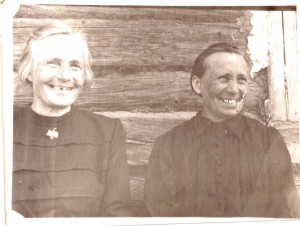A couple months ago I took my son to visit my Aunt Birutė to talk about family history and my grandmother’s exile. She gave me some extraordinary photographs during that visit, including several from Siberia. More than I expected.
One small photograph, dated 1957, shows my grandmother’s house. Made of logs and with a straw roof, it stands on fenced property. Both look bigger than I would have expected. I’d always imagined the house surrounded by forest, but the land all around her house is flat.
Another shows my grandmother and her sister Magrieta standing in the garden, up to their knees in lush leaves. They wear matching shirts and skirts made from fabric sent in care-packages by faraway daughters. On the back, in Magrieta’s handwriting: “The cabbage garden, beyond it that you can see the potatoes and fence.” I’m struck by how happy my grandmother looks in these photographs: strong and ruddy, she could be an early American pioneer. (In the above photograph my grandmother sits on the left. She has several teeth missing, knocked out in an accident with a combine harvester.)
For the last few weeks, I’ve been singing a new song to my son Sebastian at bedtime. We call it “The Bird Song.” I learned it at summer camp as a child.
Like birds returning home
Lead us too, oh Lord.
From the sad road of exile,
Gather us up.
The song was written by my grandmother’s generation about returning to the place they fled or were forced to leave. Now, as I sing my son to sleep, it is these photographs of my grandmother in her cabbage garden that appear in my mind’s eye.
Home: I wonder if it felt like a homecoming when my grandmother returned to Lithuania after seventeen years. Can there be home without family? Her children were grown and far away; it would be another seven years before she saw her family again, when she emigrated Canada. But is family enough to restore home? Surely this country wasn’t home either: the language and customs remained strange to her until her death.
Did exile rob my grandmother of her home in more fundamental way than mere displacement? By taking her away by force, did her captors kill the very possibility of home?
Most people still die within a few kilometres of where they were born. Not so for my grandmother. Not so for many of us who move often and far either by choice or necessity. So what are the ties that bind the landless far from loved ones?
What is home to the exiled?
[Photo: Ona and Magrieta in Brovka, Siberia, 1957. Photographer unknown]



This one gave me shivers!!! I wonder if she believed her loss allowed her to gain something she wouldn’t have otherwise…
Thanks Katie,
I’ve been thinking about this idea of home for a while and especially about my grandmother’s relationship to the land and life in Siberia. I’ve always gotten this amazing impression of strength from her letters, from the things people said about her, and from the Siberian photographs. I know that she was deeply respected in her Siberian village, and she was very good at what she did (she raised calves for the collective farm and managed to feed herself and her sister off their small plot of land). She built a life, despite all the loss. But the “homecoming” is what intrigues me most. I too wonder if that’s when another kind of loss happened. These are things I’m now trying to work out.
I lived in Lithuania for 6 years teaching English and I was taken to the annual meeting of the ‘uztremtinai ‘ ( not sure if I remember right – ‘those who were taken away ‘) in Prienai
and they sang that song .
I must admit the tears were rolling down my face – it stays with me now as the most moving thing I’ve ever head
Labas Persikai (or Digital Dave!), thanks so much for your note. Wow, you’re very lucky to have witnessed that meeting. What a treasure. I once happened upon a meeting in Vilnius in 1989 where returned exiles or the family of exiles were discussing the possibility of exhuming bodies and returning them to Lithuania for burial. Many did just this in the 1990s. That meeting, like your experience, has stuck with me too. Something about the idea of moving the dead so many kilometres, braving the frozen tundra, and the love that such a journey bore witness to moved me immensely. I ended up writing a short scene about it in my first book, and it’ll probably return in some way in the book I’m writing now about my grandmother.